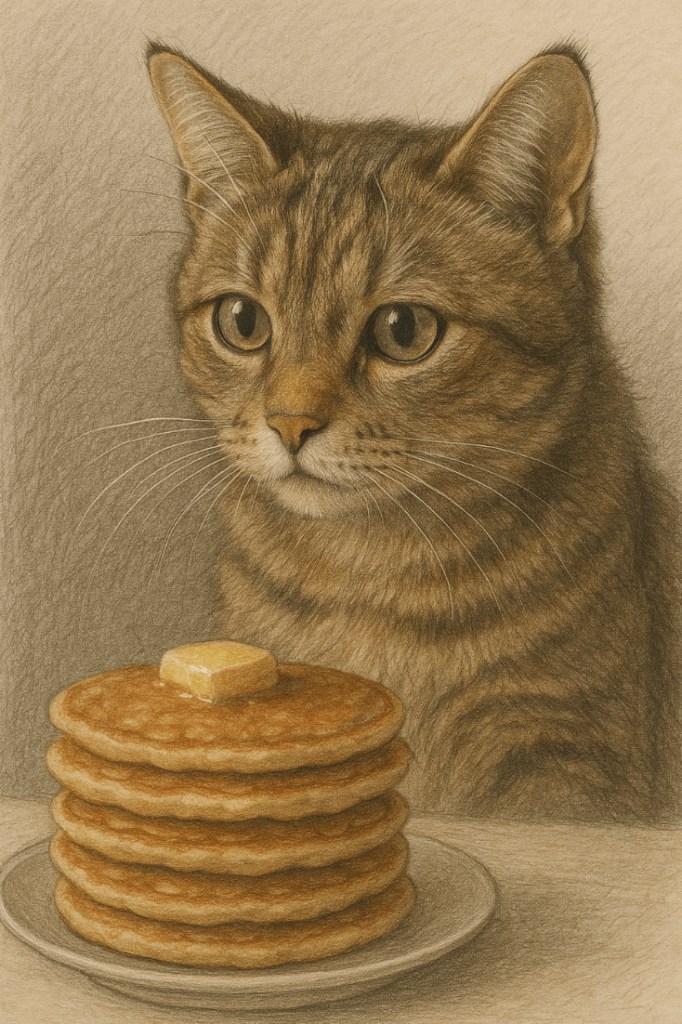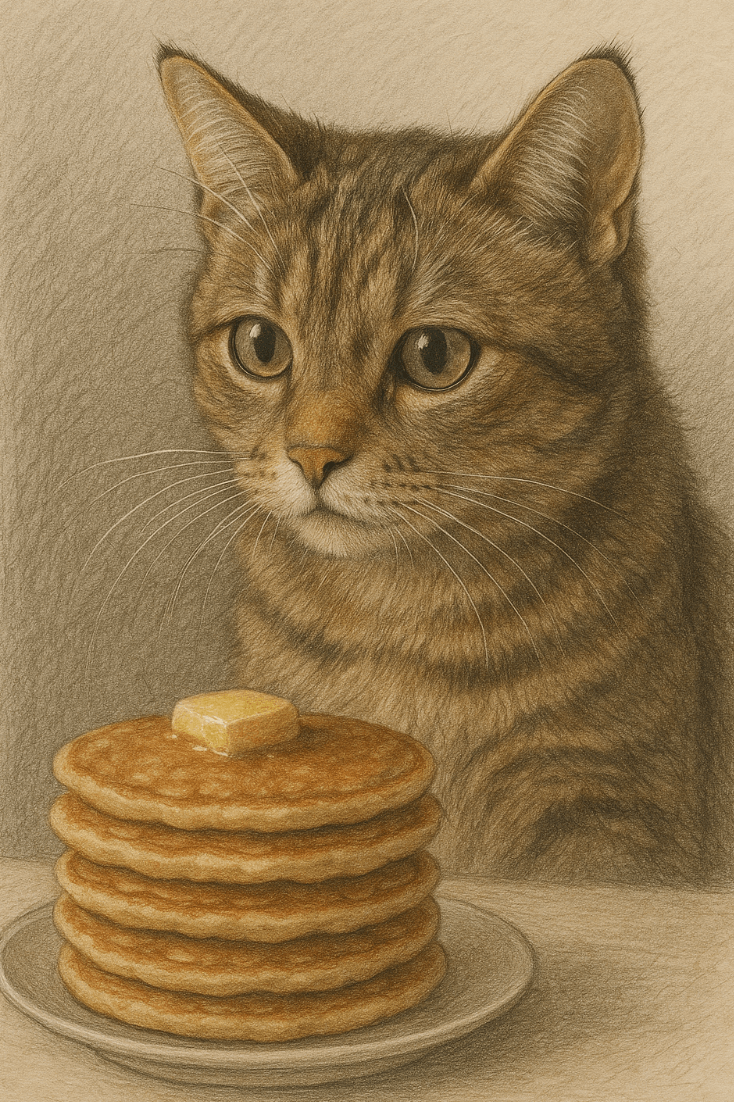Can Cats Eat Pancakes?
Pancakes are a beloved breakfast staple for humans, but what happens when your curious feline friend shows interest in this fluffy treat? While cats are naturally carnivores, their curiosity often leads them to investigate human food. But can cats safely eat pancakes? The answer isn’t as straightforward as you might think. Pancakes may seem harmless, but certain ingredients and preparation methods can pose risks to your cat’s health. In this blog post, we’ll explore whether pancakes are safe for cats, potential dangers, and how to offer occasional treats responsibly. Let’s dive into the details to ensure your furry companion stays healthy while satisfying their culinary curiosity.
Potential Risks of Feeding Pancakes to Cats
While pancakes might look like a fun snack, they can contain ingredients that are harmful or difficult for cats to digest. Understanding these risks is essential to protect your pet’s well-being.
High Sugar Content:
Pancakes are often loaded with sugar, which can lead to obesity, diabetes, and dental issues in cats if consumed regularly.Dairy Ingredients:
Many pancake recipes include milk or butter, both of which can upset a cat’s stomach due to lactose intolerance.Artificial Additives:
Flavored syrups, artificial sweeteners (like xylitol), and toppings such as chocolate are toxic to cats and should be avoided entirely.Gluten and Carbohydrates:
Cats lack the enzymes needed to process grains effectively, making wheat-based pancakes hard to digest.Choking Hazards:
Large pieces of pancake or sticky textures can pose choking risks, especially for smaller or more eager cats.
These risks highlight why pancakes should be approached with caution and offered only in moderation, if at all.
How to Safely Offer Pancakes to Your Cat
If you decide to let your cat try a bite of pancake, it’s crucial to do so safely. Here are some guidelines to minimize risks and ensure their safety.
Choose Plain Pancakes Only:
Avoid pancakes with added sugars, syrups, or toppings. Stick to plain, unflavored versions made without harmful ingredients.Limit Portion Sizes:
Offer only a tiny piece—about the size of your thumbnail—to prevent overeating or digestive upset.Check for Allergies:
Monitor your cat closely after offering a small piece to ensure they don’t have an adverse reaction.Skip Dairy Products:
Use dairy-free alternatives if preparing homemade pancakes specifically for your cat.Consult Your Veterinarian:
Always seek professional advice before introducing new foods into your cat’s diet.
By following these steps, you can reduce the likelihood of complications while allowing your cat to enjoy a rare indulgence.
Check this guide 👉Can Cats Eat Cabbage? Best 7 Expert Tips!
Check this guide 👉Can Cats Eat Asparagus? Best 7 Expert Tips!
Check this guide 👉Can Cats Eat Pasta? Best 7 Expert Tips!

Safe Alternatives to Pancakes | Risks of Unsafe Ingredients |
|---|---|
Cooked plain chicken or turkey | High sugar content leading to obesity |
Small pieces of boiled egg | Lactose intolerance causing diarrhea |
Pure pumpkin puree (unsweetened) | Artificial sweeteners like xylitol |
Soft fruits like banana slices | Chocolate toxicity |
Homemade cat-safe biscuits | Sticky textures posing choking hazards |
Signs Your Cat May Be Struggling After Eating Pancakes
Even with precautions, accidents can happen if your cat consumes pancakes with harmful ingredients. Watch for these warning signs to act quickly if something goes wrong.
Vomiting or Diarrhea:
These symptoms indicate digestive distress, possibly caused by lactose or excessive sugar.Lethargy or Weakness:
A sudden lack of energy could signal poisoning from toxic additives like xylitol.Excessive Drooling:
Drooling may suggest irritation or discomfort from ingesting sticky or sugary foods.Difficulty Breathing:
Choking or allergic reactions can cause breathing problems, requiring immediate attention.Loss of Appetite:
Refusal to eat or drink might indicate internal discomfort or illness.
Recognizing these signs early allows you to seek veterinary care promptly, preventing further complications.
Nutritional Needs of Cats vs. Human Foods
Cats have unique dietary requirements that differ significantly from humans. Understanding their nutritional needs helps explain why pancakes aren’t ideal for them.
Obligate Carnivores:
Cats require a diet rich in animal protein and fats, not carbohydrates like those found in pancakes.Limited Digestive Enzymes:
Unlike humans, cats lack the enzymes needed to break down plant-based starches effectively.Hydration Through Food:
Cats rely on moisture-rich diets, whereas dry or sugary foods can dehydrate them.Essential Nutrients:
Taurine, arachidonic acid, and vitamin A are vital nutrients for cats that pancakes cannot provide.Minimal Caloric Needs:
Cats require fewer calories than humans, so high-calorie treats like pancakes can lead to weight gain.
This comparison underscores why sticking to species-appropriate food is critical for your cat’s long-term health.
Common Mistakes to Avoid When Sharing Human Food with Cats
Feeding human food to cats requires careful consideration to avoid mistakes that could harm their health. Here are some pitfalls to watch out for.
Assuming All “Natural” Foods Are Safe:
Just because a food is natural doesn’t mean it’s safe for cats; many natural ingredients can still be toxic.Overlooking Ingredient Labels:
Harmful additives like xylitol or artificial flavors may go unnoticed if you’re not vigilant.Ignoring Portion Control:
Even seemingly harmless foods can cause issues if fed in large quantities.Neglecting Individual Sensitivities:
Every cat is different; what works for one may not work for another.Skipping Veterinary Advice:
Consulting a vet before introducing new foods prevents accidental harm.
Avoiding these mistakes ensures a safer experience when sharing occasional snacks with your cat.
Alternatives That Mimic the Fun of Pancakes
If you want to give your cat a special treat without the risks associated with pancakes, there are plenty of alternatives that mimic the fun of sharing food.
Homemade Cat Treats:
Recipes using cat-safe ingredients like salmon or tuna provide a guilt-free indulgence.Freeze-Dried Meat Pieces:
These treats offer a satisfying crunch and pack a protein punch that cats love.Small Portions of Fruits:
Bananas or blueberries (in moderation) are safe, tasty options for adventurous eaters.Edible Cat Grass:
Satisfy their chewing instincts with cat grass, which also aids digestion.Commercial Cat Snacks:
Store-bought treats designed specifically for cats are a convenient and safe choice.
These alternatives allow you to bond with your cat while keeping them safe and healthy.
Understanding Your Cat’s Curiosity Around Human Food
Cats are naturally curious creatures, and their interest in human food stems from instinctual behaviors and sensory exploration. Understanding their motivations helps manage expectations.
Hunting Instincts:
Cats associate food with hunting, so moving objects like pancakes flipping in a pan may catch their attention.Scent Sensitivity:
Strong aromas from cooked foods intrigue cats, even if they wouldn’t normally eat them.Social Bonding Desire:
Sharing food is a bonding activity for humans, and cats may seek inclusion as part of their social structure.Boredom or Attention-Seeking:
Cats may beg for food out of boredom or to gain your attention rather than genuine hunger.Exploration Through Taste:
Cats use their mouths to explore new textures and flavors, much like kittens learning about the world.
By recognizing these behaviors, you can address their curiosity appropriately while keeping their diet balanced and safe.
Frequently Asked Questions About Cats and Pancakes
Can cats eat syrup-covered pancakes?
No, syrup contains high sugar levels and artificial additives that are harmful to cats.
Are gluten-free pancakes safe for cats?
While gluten-free options eliminate wheat, other ingredients like sugar or dairy may still pose risks.
What if my cat accidentally eats pancake batter?
Monitor your cat closely for signs of distress, and contact your vet if you notice any unusual behavior.
Can kittens eat pancakes?
Kittens have even more sensitive digestive systems, so pancakes should be avoided entirely.
What should I do if my cat shows interest in pancakes?
Redirect their attention to a cat-safe treat instead of sharing human food.
Prioritizing Your Cat’s Health Over Pancake Temptations
While it’s tempting to share your favorite foods with your feline friend, pancakes simply aren’t suitable for cats due to their high sugar, carbohydrate, and dairy content. Instead, focus on providing nutritious, species-appropriate meals and treats that cater to their unique dietary needs. By understanding the potential risks and opting for safer alternatives, you can ensure your cat stays healthy and happy. Remember, your cat relies on you to make the best dietary choices for them—so always prioritize their well-being above all else.
Do Cats Have Taste Buds? Best 7 Expert Tips! – Discover how cats experience flavors and why their taste is so unique.
Do Dogs Have Taste Buds? Best 7 Expert Tips! – Discover how dogs experience taste, their preferences, and what it means for their diet and health.
Can Cats Taste Sweet? Best 7 Expert Tips! – Discover why cats can’t taste sweetness, how it affects their diet, and tips to keep them healthy and happy.
Can Dogs Taste Sweet? Best 7 Expert Tips! – Discover how dogs perceive sweetness, which foods are safe, and tips to manage their sweet cravings responsibly.





